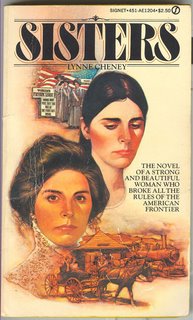
Our house is full of books. That's one of the occupational hazards of having two English professors in the family. We have old books, new books, poetry books, political books, books on continental philosophy, books on home repair, books about books, books about food, books about DOGS, and lots of books about gays, lesbians, and other happy people. We also have some trashy books that have been disowned by their own authors, such as the 1981 novel, Sisters, written by super-RightWing Satan Girl and Second "Lady" of the United States, Lynne Cheney.
Cheney's frontier boddice-ripper, which traffics in incest, prostitution, near-rape, something like murder, and steamy but apparently non-sexual Sapphism, is suddenly back in the news because desperate Republicans have decided to go after Democrats not for their policies or platforms but for the parties they've attended and the novels they've written. Why not? Most Republican policies these days are woven out of fiction anyway, so why not pull a few lurid passages out of a novel and use them to tar your opponent as a misogynist who is not fit for office? It beats hell out of trying to justify your support for a useless war that has led to the deaths of more than 2800 Americans and god knows how many Iraqis. (Read about Senator George Allen's scurrilous attacks on James Webb's writings here.)
Which brings us back to Sisters. Everybody knows the Cheneys have never been as strenuously homophobic as Republicans are supposed to be, at least publicly. Their lesbian daughter, Mary, has earned them a pass in the paroxysms of gay panic that regularly (one might say strategically) seize the GOP. In the 2004 campaign, Vice President Darth Vader even acknowledged that he was opposed to a constitutional amendment to ban same-sex marriage, though he mostly kept his mouth shut as his party exploited the issue to whip its evangelical base up into a frenzy. Still, it's a little surprising to pick up Sisters and see the queen of the culture wars, who has made a career out of denouncing feminist and multicultural scholarship, celebrating female friendship as an alternative to marriage. In the book's acknowledgements, Cheney credits feminist historians Linda Gordon and Carroll Smith-Rosenberg with helping her to understand the daily, personal lives of 19th-century women and even singles out Smith-Rosenberg's famous article of 1975, "The Female World of Love and Ritual," for "guid[ing] [her] thinking."
Cheney got testy with CNN's Wolf Blitzer for bringing up Webb's response to the attacks on his work, because Webb dares to mention Sisters, Sapphistry, and Cheney's 1988 novel, The Body Politic, which features a Republican vice president who dies of a heart attack while having sex with his mistress. (You can see an excerpt from the interview with Blitzer here.) According to the indignant Mrs. Cheney, the difference between being American Grandmother of the Year (her) and Left-Wing Moonbat Sex Perv of the Century (Webb) is the difference between being sexually implicit (about rape, incest, and lesbianism) and being sexually explicit. As she puts it to Blitzer:
Jim Webb is full of baloney. I have never written anything sexually explicit. His novels are full of sexual (sic) explicit references to incest, sexually explicit references -- well, you know, I just don't want my grandchildren to turn on the television set.Per usual, fans of Roxie's World, we want you to judge for yourselves. You can check out a pdf version of Sisters here. Or, if you want to stay right where you are, here's one of our favorite Sapphic morsels from Sisters. Most of the Sapphistry in the novel occurs off-stage and retrospectively. The protagonist, Sophie Dymond (nice touch with the allegorical naming, Lynne!), discovers that her late sister, Helen (married, with children), has had a passionate friendship with the schoolteacher, Amy Travers. Sophie comes across a parcel of letters from Amy to Helen. Among them is this seductive invitation:
Let us go away together, away from the anger and imperatives of men. We shall find ourselves a secluded bower where they dare not venture. There will be only the two of us, and we shall linger through long afternoons of sweet retirement. In the evenings I shall read to you while you work your cross-stitch in the firelight. And then we shall go to bed, our bed, my dearest girl. . . .The letters repeatedly invoke the Ladies of Langollen, common 19th-century signifiers of women's romantic friendships, as Cheney no doubt learned from her reading in Smith-Rosenberg. Technically, of course, Cheney is correct that she stays on the "right" side of the line between implicit and explicit depictions of sexuality, but one wonders if foaming-at-the-mouth homophobes will be satisfied with Cheney's insistence that there's nothing sexual in this fantasy of 24/7 girl-on-girl intimacy. I mean, heck, cross-stitching involves needles, doesn't it, and that's clearly some tawdry allusion to a sexual apparatus. Then there's that "bed, our bed, my dearest girl. . . ." (ellipses in original).
It's a tricky business, Mrs. Cheney, pinning down the line between the implicit and the explicit, the erotic but non-sexual and full-on genital action. We here at Roxie's World think that if you can't stand the heat you'd better stay out of the boudoir. Lesbianism ain't for sissies, "sister."
No comments:
Post a Comment
Note: Only a member of this blog may post a comment.